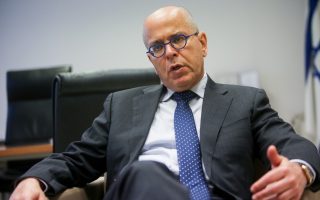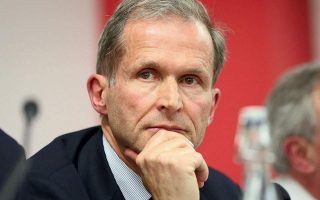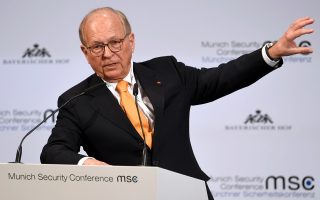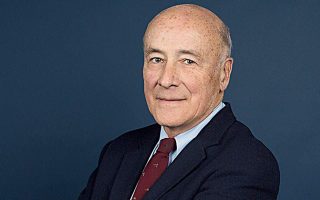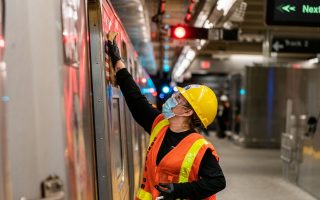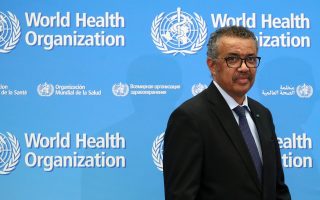The Church needs saints, Ieronymos tells Kathimerini
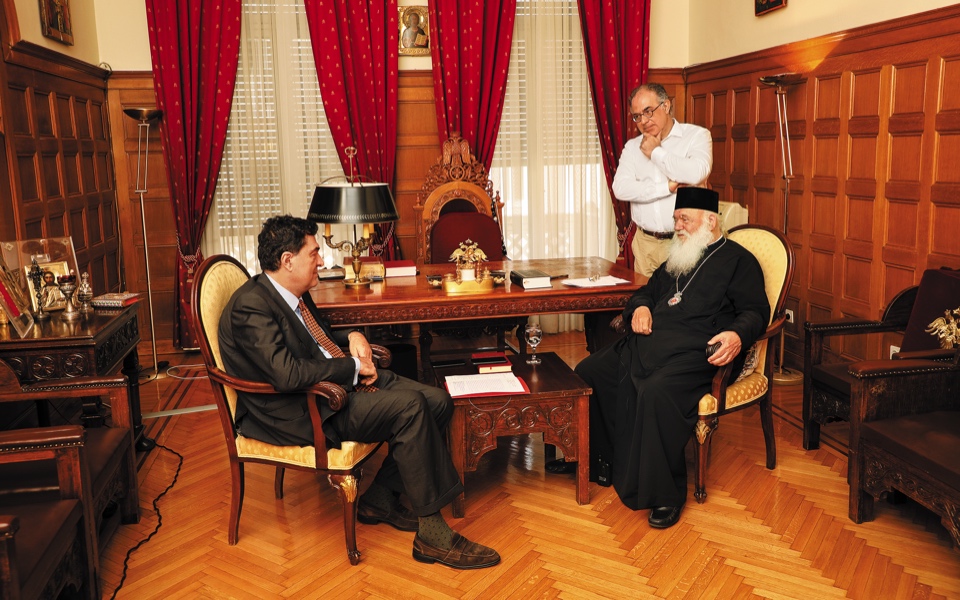
Possessing all the wisdom of the institution he represents, with his finger on the pulse of society and displaying a surprisingly open mind for a man of his years, Archbishop of Athens and All Greece Ieronymos is always a fascinating interlocutor.
I met the 82-year-old primate of the Church of Greece at his office on Friday morning, expecting to find him dispirited by the experience of being caught in the middle of a maelstrom triggered by the government’s decision to close the country’s churches as part of restrictions to stem the spread of the coronavirus. There was the state and its experts on one side, and hardline clerics on the other, accusing him of betraying his faith by upholding the closure. And all of this was going on at a time when he had to be fitted with a pacemaker.
Nevertheless, Ieronymos was anything dispirited. What I found instead was a man who is fighting fit and annoyed by the accusations that had been leveled against him. He was also ready to answer every question put to him, whether it was about the battle for his succession or his relationship with former prime minister Alexis Tsipras.
I watched you standing alone in the empty Athens Metropolitan Cathedral during Holy Week ahead of Easter and wondered what was going through your mind in that moment.
It was very hard, but we have a duty not to walk away and abandon the effort, but to cooperate. The state’s experts, who we could not dismiss, had told us that this is what had to be done. We convened the Synod and it upheld the state’s recommendations… with the tragic, for us, result of having to hold services behind closed doors. But, as clerics, we have to put the people above all else because, after all, what is the Church without man? And what is the Church’s mission without man? There is a rule to put the salvation of man above all else, so it is, therefore, our duty to uphold this. In my opinion, thinking people and people with true faith adopted this point of view and we also owe a big “thank you” to those who worked so hard during this adventure to bring such praiseworthy results for Greece. Everyone admits that the programs carried out and everything that was planned brought a result that was, given the circumstances, good.
What were you thinking looking out at the empty cathedral?
I will say one word, in inverted commas: “Opportunity.” Our petty interests and complaints often make us forget the grace of God and all the potential He has given us. How often have we wondered in our sermons where all the Christians are? And then this event comes along and you’re looking at an empty church and you have nothing, because what is your object without people? Then another thought comes automatically concerning what connects us, and the common bond of this love is Holy Communion.
Another thought: What are the results and benefits of globalization, and are we moving toward closed borders? Are we starting to experience a new situation, where the borders between people are closed? When the restrictions suddenly put family members in close quarters all the time, we did not know what this would result in, because there were many consequences. There were psychological consequences, factors we had never considered, questions concerning our children’s upbringing, their reactions and thoughts, that had not come to our attention. A new world has been born and we have to deal with it, and this presents an opportunity for the Church. We already have a lot of issues to deal with, like unemployment, hunger and poverty. Many people ask us whether we will organize soup kitchens. Our answer is that we’ll wait and see for the time being. All of these issues have arisen from this tragic pandemic, and we will be on hold, waiting.
Many people felt fear. You had surgery at the peak of the epidemic. Were you scared?
Look, as it happened, in those days, under those circumstances and, actually, when I was just about to give an interview on all these issues – the doctor came to me and said: “Stop everything. The surgery we had planned needs to be done tomorrow” – the only thing I could say, and please don’t laugh, was that I wasn’t ready and had some loose ends to tie up. I was talking about loose ends in my private and professional life. And that is the time for heroic decision. Well, I survived, as did others, in this awful atmosphere. I looked death in the eye. Elderly people are prepared for death, but everything around death, our emotional world, the people we love and who love us, thoughts about all the things we need to do and complete, these were the issues that concerned me as I lay in the [hospital] bed.
The Church of Greece came under fire, especially on social media, during that period of debate concerning the closure of churches. Some accused the Church of ignoring the science by insisting that Holy Communion is not dangerous or said that health regulations had to be imposed in churches. How do you respond to this criticism?
As I have said before, it is my belief that the issue of Holy Communion cannot become the subject for debate. It is not a personal issue, but one that concerns everyone. All that talk about doing one thing or another was groundless. Our Church does not permit members of the clergy to do whatever they want. We have the Synod, the Hierarchy. And either you are a member of this body and you abide by it, or you leave. So if technical, trivial issues require understanding, cooperation, major issues [such as] Holy Communion do not lie [within the discretionary authority] of the Church of Greece, or even the patriarch; it is a pan-Orthodox issue, because it pertains to the substance of our Church. Without the Holy Communion there is no Church, there is no need [for one].
Were there scientists, such as Professor Sotiris Tsiodras for example, who you trusted specifically during this period?
I spoke to a lot of people and it came down to how they were brought up and how they work. Many people told me that they would take communion and they did. And some of them were important scientists, university professors etc. It is a very big issue.
We saw certain clerics violating the rules set by the state and the Church. They came under public criticism, but what do you plan to do about it?
I do not think that this should be the only subject we’re concerned with right now and I would say that neither the Church nor the state need to occupy themselves with the subject, because we do not know what lies ahead. I saw that the people of the Church, the congregation, adapted, but I do not know whether this was appreciated. We saw cases of crowds on beaches, crowds in parks, people walking and running, and it was only natural that this would create temptation in some people and make them think: Why am I prevented from going to church when that person, who wants to go running, is free to do so? It did create some bitterness, but these are details that can be put off for consideration. We should not be concerned right now about reprimanding or punishing anyone, but with encouragement.
Another phenomenon we observed was division within the Church. You came under particularly scathing criticism, accused of betraying your faith and championing a new order. Why did this happen?
The Hierarchy is more united today than it has ever been. But when there are 82 people, it is only natural to have five or six with different opinions, which must be respected and can be interpreted in any possible way. What is not allowed, though, is to go against the majority. The majority vote rules. When I was ordained as a bishop and climbed the Church hierarchy, I asked myself: Who am I? What is my purpose? And I made a confession of faith: I said that, yes, I will be disciplined, from an ecclesiastical side. But this was not enough on its own. When it comes to the relationship between the Church and the state, which is a particular kind of relationship, I am not sure what they want. Were we to go the president of the Republic and give assurances? What is a bishop to say? Yes, I have sacred rules that I will uphold, but I will also uphold the Constitution and the laws of the state? These aren’t just words. They have consequences. Therefore, someone who has not been in this position has no right to stand up in church on Sunday and preach “For You alone, God…” and not abide by it. So we are talking about an inconsistency and this inconsistency cannot be left at that. It is deliberate. It needs to be dealt with, but because these are difficult times, we will let God decide.
When you say it’s deliberate, do you mean that there’s an ulterior motive?
Of course. Ego and bravado – these are things we see every day. The Church does not need ersatz heroes; it needs saints. That is the purpose of our Church and this is what we strive for. This is why we should not look at these things selfishly. We are human, after all.
What do you think about in the tough times? What keeps you awake at night?
Let me say something that will help everyone. Back at the start, when I had a lot of problems like debts etc, I would tell my mentor, Father Ephraim: “I do not ask to see the Holy Light. I am aware of what a mess I am in.” He took me by the hand and said: “Those who see it don’t talk about it. Those who talk about it, haven’t seen it.” This was a 72-year-old monk, living in a cave, with nothing but his reading. And this is what frightens me the most: hypocrisy. There’s no thermometer for faith; it’s not something you can measure. An entire month of prayer cannot give what a few moments of faith can.
Common ground with Tsipras,
relationship with Mitsotakis
Do you feel chagrined in any way by the way the government or its experts handled the crisis?
There is no doubt that things were exaggerated at times. But overall, we need to say a big “thank you” today – despite the exaggerations from one side or the other – for the determination of the state’s central management, the prime minister and the ministers who acted in an effective and swift manner.
Do you feel that the Church may have been treated in a somewhat cavalier manner?
No, we had cooperation. I spoke with the prime minister on numerous occasions and I respected what he had to say, but I also asked that he respect the decisions of the Perpetual Holy Synod. The Perpetual Holy Synod cannot say, “I will close the churches.” The state has the right to say that. These are necessities. But it raises the question: Do I have the right to do this? Can I do this? And you have to make a decision, which is the tragedy of every person who has to say “yes” or “no.” I would like to use this opportunity to stress that it is the duty of the Church to strive to work with the state, any state. I have no regrets for working with every prime minister, from the first to the last. I have maintained my political beliefs, but cooperation is the most important thing because we have a duty to work for the people. And this is what I think we accomplished here to a great degree.
You appeared to have had a particularly close relationship with former prime minister Alexis Tsipras. Is this also the case with the current premier, Kyriakos Mitsotakis?
There has not been much opportunity with the present prime minister, but I am more than happy with the contacts we have had. There were different opportunities with Mr Tsipras, which allowed us to find common ground despite our clashes and differences of opinion. Let me give you an example: When Mr Tsipras first came to visit me as prime minister, he said, “We need to rationalize the relationship between Church and state.” He had said this before and I said that I did not understand what this means, so he started to explain it to me. I noticed as our discussion proceeded that, in my opinion, he was influenced by the books and studies of Nikos Alivizatos, the famed constitutional law expert and professor. I told [Tsipras] that the history of the Greek state does not begin in 1945, as Mr Alivizatos believes. The life of the Greek state begins at the monastery [of Saint Nicholas] in Kaltezes, during the War of Independence. This, however, provided an opportunity for many discussions with Mr Tsipras, where I was able to explain, for example, that the state was not doing us any favors by paying our salaries, that this was money owed to us.
It was only natural therefore, that through our respective concerns and our discussion, we formed a close connection. This is not something that should be misunderstood. For example, I felt very comfortable and still do, meeting Mr [Antonis] Samaras, and worked well with him. Or Mr [Lucas] Papademos, who is a wonderful person, but I did not presume to have such a relationship with him. That’s how it is with people. I appreciate Mr Mitsotakis, I respect him as a prime minister and I want cooperation, but the issues of the Church right now are enormous. They are enormous, and this is always difficult.
